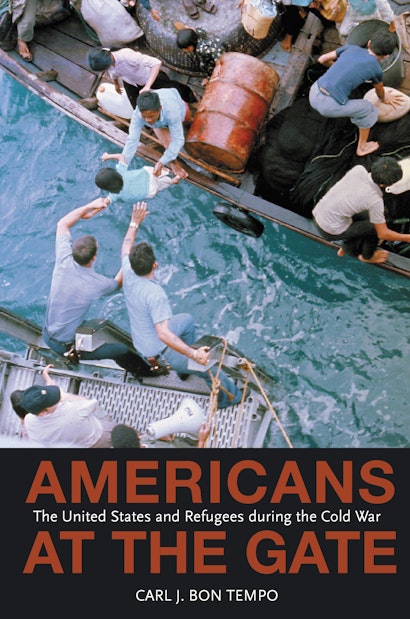Unlike the 1930s, when the United States tragically failed to open its doors to Europeans fleeing Nazism, the country admitted over three million refugees during the Cold War. This dramatic reversal gave rise to intense political and cultural battles, pitting refugee advocates against determined opponents who at times successfully slowed admissions. The first comprehensive historical exploration of American refugee affairs from the midcentury to the present, Americans at the Gate explores the reasons behind the remarkable changes to American refugee policy, laws, and programs.
Carl Bon Tempo looks at the Hungarian, Cuban, and Indochinese refugee crises, and he examines major pieces of legislation, including the Refugee Relief Act and the 1980 Refugee Act. He argues that the American commitment to refugees in the post-1945 era occurred not just because of foreign policy imperatives during the Cold War, but also because of particular domestic developments within the United States such as the Red Scare, the Civil Rights Movement, the rise of the Right, and partisan electoral politics. Using a wide variety of sources and documents, Americans at the Gate considers policy and law developments in connection with the organization and administration of refugee programs.
Some images inside the book are unavailable due to digital copyright restrictions.
Carl J. Bon Tempo is assistant professor of history at the State University of New York at Albany.
"The author is adept at unraveling the complex underpinnings and evolution of this postwar 'American identity,' utilizing an impressive range of archival and published sources. . . . For those specializing in post-WW II US history, this is an essential contribution."—K.A. Tyvela, Choice
"Carl J. Bon Tempo has done a solid overall job of examining the acceptance of refugees into the US during the Cold War. His book is concise and historically accurate. . . . It deserves consideration by scholars of human rights, migration, and foreign policy. It provides a good base for dispersing information and facts to students as well and should be useful in undergraduate courses for this purpose."—Samuel S. Stanton, Jr., Law and Politics Book Review
"In the post-war period, the United States admitted millions of refugees. In this ambitious book, Carl J. Bon Tempo set out to explain how and why this new American approach to refugee affairs developed and evolved between the early 1950s and the late 1980s. In doing so, the author decided to go beyond foreign policy imperatives to confront a multiplicity of factors, weighing the evolution of their relative significance. Set in the Cold War context, the impact of anticommunism at home and abroad constitutes the main element of this study. Indeed, the propaganda value of accepting refugees fleeing communism remained central to US policy and manifest in the persistence of the 'refugee equals European anticommunist' equation. Bon Tempo's study of how this equation evolved and receded—without totally disappearing over the period—is a major contribution of this book."—Cold War History
"Carl Bon Tempo's new book offers a new perspective. . . . By placing the overlapping and intertwined problems and dichotomies of the Cold War, human rights and, to a lesser extent, the Civil Rights movement as part of American refugee policies, this book deserves to be read."—Mario Menéndez, Revue Francaise d'Etudes Americaines
"This book is a superb introduction to the history of U.S. refugee politics and policy and an important contribution to American civic education."—Karen Jacobsen, Journal of American Ethnic History
"Bon Tempo's deft and compelling narrative works at the intersection of the domestic and the global to marvelously recast our understanding of post-1945 American attitudes and policies toward refugees. Looking beyond a more traditional Cold War frame, he convincingly explores how the overlapping and intertwined histories of anticommunism, race, electoral politics, the human rights movement, and the growing power of the American state shaped the always contingent U.S. commitment to refugees. This book is a model of the richness the international angle infuses into the study of American history."—Mark Bradley, University of Chicago
"While refugee policies have been the subject of a number of books and articles in recent years, no one has done a thorough study before. Clearly written and detailed, Bon Tempo covers a great deal of ground. The research is impressive."—David M. Reimers, New York University

